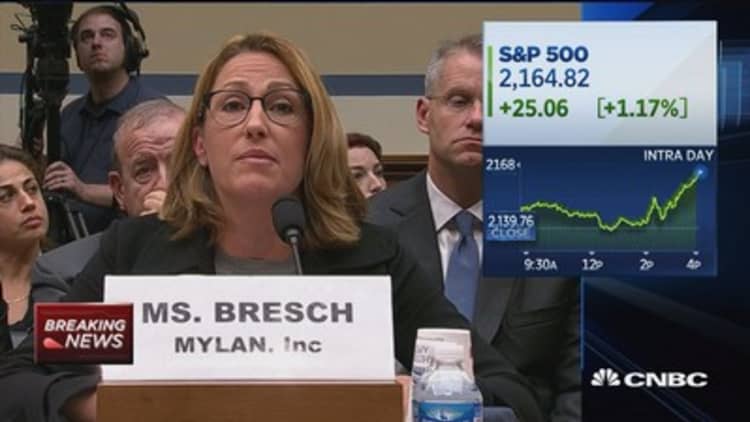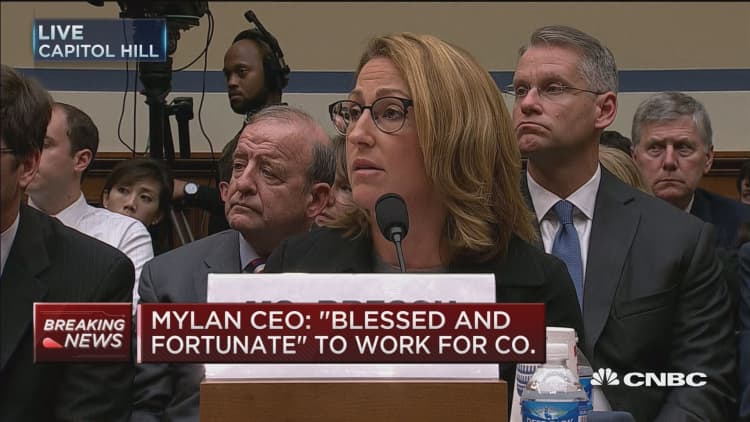
The CEO of pharma giant Mylan might need some strong medication of her own after getting a congressional beat down.
Mylan chief Heather Bresch and her company were accused of "disgusting" greed and of getting "filthy rich" by congressmen as she sought to defend the company's decision to hike the price of lifesaving anti-allergy EpiPens by more than 500 percent in recent years.
"The greed is astounding, it's sickening and disgusting," Rep. John Duncan, R-Tenn., told Bresch as she was grilled by members of the House Oversight and Government Reform Committee over the now-more-than $600 price for a two-pack of EpiPens.
"I'm a very conservative, pro-business Republican, but I am really sickened by what I heard today, and what I've read before about this situation," Duncan said.
"In my opinion, no one can really earn or deserve $19 million a year," said Duncan, referring to an amount close to what Bresch made last year.
Bresch, started the hearing by arguing that the company isn't making profits that come close to the more than $600 sticker price.
"I'm proud to be the CEO of Mylan, but I never expected to be here under these circumstances — discussing the price of EpiPen Auto-Injectors," Bresch told the committee.
"I've spent my entire career working to break down barriers, expand access to high-quality medicines and lower health-care costs," said Bresch, whose company has increased the price of EpiPens more than 500 percent in recent years.
"It troubles me greatly that the EpiPen product has become a source of controversy," said Bresch, 47, whose father is U.S. Sen. Joe Manchin, D-W. Va.

Before she testified, a stone-faced Bresch was lambasted by the ranking minority member of the committee, Rep. Elijah Cummings, D-Md., who told her he wasn't "impressed" by her prepared remarks.
Cummings said Mylan was "yet another drug company" that "had jacked up the price of a lifesaving product for no discernible reason."
Mylan did so, Cummings fumed, "to get filthy rich at the expense of our constituents."
And Cummings compared Mylan and Bresch to former Turing CEO Martin Shkreli and ex-Valeant CEO Michael Pearson who "sat at this same witness table" months ago, when they were grilled about their own companies' big price hikes of old drugs. Those two CEOs, Cummings said, had "absolutely no remorse, none!"
"In Mylan's case, they had a virtual monopoly over the market, and they took advantage of it," Cummings said,. "They use the simple, but corrupt business model that other drug companies have repeatedly used: find an older, cheap drug that has virtually no competition, and then raise the price over and over and over again."
Bresch said during testimony that Mylan has 94 percent of the market share for sales of auto-injection devices containing epinephrine, the drug that counteracts the potentially fatal allergic reaction known as anaphylaxis.
Cummings asked Bresch, "You agree that you made hundreds of millions of dollars based on EpiPen" in 2015?
"Yes sir," Bresch answered.
Rep. John Mica, R-Fla., later asked Bresch what her salary was.
"About $18 million," Bresch answered.
Mica then quipped: "Sounds like you're doing pretty good on this."
Bresch said her compensation is in the "middle" of her pharma company CEO peers.
The controversy that Mylan faces exploded in August when consumers expressed outrage that a two-pack of EpiPens now cost more than $600 in cases where users had to pay full price. August traditionally sees the biggest EpiPen sales as parents buy packs of the devices in preparation for the school year.
Consumer complaints drew the attention of Congress, as well as the presidential campaign of Democratic nominee Hillary Clinton, who called for a rollback of EpiPen prices.
Bresch on Wednesday blamed misconception about EpiPen prices on an "opaque and frustrating" system for pricing pharmaceuticals.
"I know there is considerable concern and skepticism about the pricing of EpiPen Auto-Injectors," Bresch said. "I think many people incorrectly assume we make $600 off each EpiPen. This is simply not true."
"In the complicated world of pharmaceutical pricing, there is something known as the 'Wholesale Acquisition Cost,' or WAC," she said. "The WAC for a two-unit pack of EpiPen Auto-Injectors is $608. After rebates and various fees, Mylan actually receives $274. Then you must subtract our cost of goods which is $69. This leaves a balance of $205. After subtracting all EpiPen Auto-Injector related costs our profit is $100, or approximately $50 per pen."
Bresch said that about 4 million two-packs of EpiPens, or 8 million pens in all, have been sold in the past 12 months. That would mean, based on Bresch's own math, that Mylan's profit over the past year on EpiPens alone is about $400 million.
Bresch noted that Mylan soon will roll out a generic version of EpiPen, which will sell for about half, or $300, of the current wholesale price. The company also has expanded its rebate program so that many patients can lower their out-of-pocket costs for buying brand-name EpiPens.
She also said that the company is working on extending the shelf life of EpiPens from 18 months to what it hopes will be 24 months.
Bresch's testimony came a day after the attorney general of her home state of West Virginia said he was conducting a probe of the rising prices of EpiPens, specifically into the question of whether Mylan engaged in fraud in how it paid rebates for the devices to the state's Medicaid program.
Also Tuesday, USA Today reported that the National Association of State Boards of Education, while headed by Bresch's mother, had launched an initiative that paved the way for school systems to begin the widespread practice of obtaining auto-injector devices to counteract anaphylaxis in schools. Because Mylan is the dominant seller of anti-allergy auto-injector devices, it directly benefits from that practice by schools.
On the same day as that story, members of the Senate Finance Committee asked the inspector general of the U.S. Health and Human Services Department to open a review of questions about how EpiPens are classified for the purpose of paying rebates to Medicaid.
Correction: Bresch appeared before the House Oversight and Government Reform Committee. An earlier version misstated the committee's name.


